-
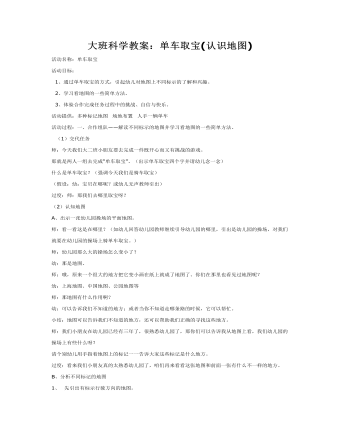
大班科学教案:单车取宝(认识地图)
2、学习看地图的一些简单方法。 3、体验合作完成任务过程中的挑战、自信与快乐。 活动提供:多种标记地图 场地布置 人手一辆单车 活动过程:一、合作组队——解读不同标示的地图并学习看地图的一些简单方法。 (1)交代任务 师:今天我们大二班小朋友要去完成一件既开心而又有挑战的游戏。 那就是两人一组去完成“单车取宝”。(出示单车取宝四个字并请幼儿念一念) 什么是单车取宝?(强调今天我们是骑车取宝) (假设:幼:宝贝在哪呢?或幼儿无声教师引出) 过度:师:那我们去哪里取宝呀?
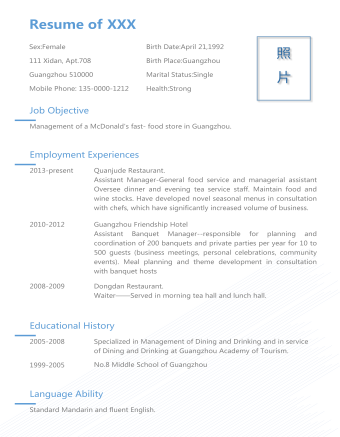
单页简洁英文简历
Guangzhou Friendship HotelAssistant Banquet Manager--responsible for planning and coordination of200 banquets and private parties per year for 10 to 500 guests (businessmeetings, personal celebrations, community events). Meal planning and themedevelopment in consultation with banquet hosts。Dongdan Restaurant.Waiter——Served in morningtea hall and lunch hall.
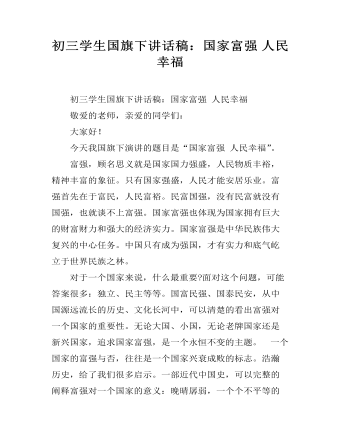
初三学生国旗下讲话稿:国家富强 人民幸福
初三学生国旗下讲话稿:国家富强 人民幸福敬爱的老师,亲爱的同学们:大家好!今天我国旗下演讲的题目是“国家富强 人民幸福”。富强,顾名思义就是国家国力强盛,人民物质丰裕,精神丰富的象征。只有国家强盛,人民才能安居乐业。富强首先在于富民,人民富裕。民富国强,没有民富就没有国强,也就谈不上富强。国家富强也体现为国家拥有巨大的财富财力和强大的经济实力。国家富强是中华民族伟大复兴的中心任务。中国只有成为强国,才有实力和底气屹立于世界民族之林。对于一个国家来说,什么最重要?面对这个问题,可能答案很多:独立、民主等等。国富民强、国泰民安,从中国源远流长的历史、文化长河中,可以清楚的看出富强对一个国家的重要性。无论大国、小国,无论老牌国家还是新兴国家,追求国家富强,是一个永恒不变的主题。 一个国家的富强与否,往往是一个国家兴衰成败的标志。浩瀚历史,给了我们很多启示。一部近代中国史,可以完整的阐释富强对一个国家的意义:晚晴孱弱,一个个不平等的条约,伴随着黄金白银的流失、大片国土的丢失,国不像国、民不聊生成为近代中国屈辱历史的沉重内容。
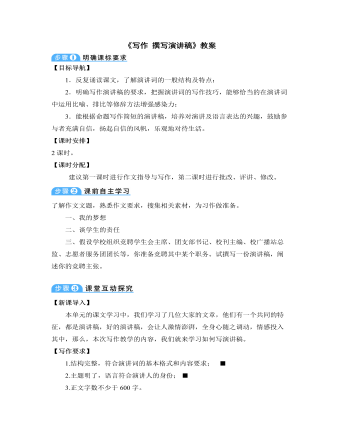
部编版语文八年级下册《写作:撰写演讲稿》教案
3.要语言流畅,不要拖泥带水要把演讲者在头脑里构思的一切都写出来或说出来,让人们看得见,听得到,就必须借助语言这个交流思想的工具。写作演讲稿在语言运用上应注意以下三个问题:(1)口语化。“上口”“入耳”,这是对演讲语言的基本要求,也就是说演讲的语言要口语化。演讲,说出来的是一连串声音,听众听到的也是一连串声音。听众能否听懂,要看演讲者能否说得好,更要看演讲稿是否写得好。如果演讲稿不“上口”,那么演讲的内容再好,也不能使听众“入耳”,完全听懂。写作演讲稿时,应把长句改成短句,把倒装句改成正装句,把单音词换成双音词,把听不明白的文言词语、成语改换或删去。演讲稿写完后,要念一念,听一听,看看是不是“上口”“入耳”。
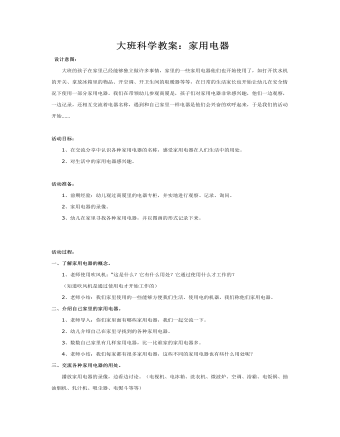
大班科学教案:家用电器
活动目标:1、在交流分享中认识各种家用电器的名称,感受家用电器在人们生活中的用处。2、对生活中的家用电器感兴趣。 活动准备:1、前期经验:幼儿观过商厦里的电器专柜,并实地进行观察、记录、询问。2、家用电器的录像。3、幼儿在家里寻找各种家用电器,并以图画的形式记录下来。 活动过程:一、了解家用电器的概念。1、老师使用吹风机:“这是什么?它有什么用处?它通过使用什么才工作的? (知道吹风机是通过使用电才开始工作的)2、老师小结:我们家里使用的一些能够方便我们生活、使用电的机器,我们称他们家用电器。二、介绍自己家里的家用电器。1、老师导入:你们家里面有哪些家用电器,我们一起交流一下。2、幼儿介绍自己在家里寻找到的各种家用电器。3、数数自己家里有几样家用电器,比一比谁家的家用电器多。4、老师小结:我们每家都有很多家用电器,这些不同的家用电器也有些什么用处呢?三、交流各种家用电器的用处。 播放家用电器的录像,边看边讨论。(电视机、电冰箱、洗衣机、微波炉、空调、浴霸、电饭锅、抽油烟机、轧汁机、吸尘器、电熨斗等等)1、这是什么?有什么用处?2、它们的形状、颜色一样吗?为什么要不一样?(满足人们不同的喜好)3、随机提问:你同意他的说法吗?还有什么意见?4、你们还有什么问题吗?可以提出来大家一起讨论?5、老师小结:家用电器用处可真大,它们给我们生活带来了方便。
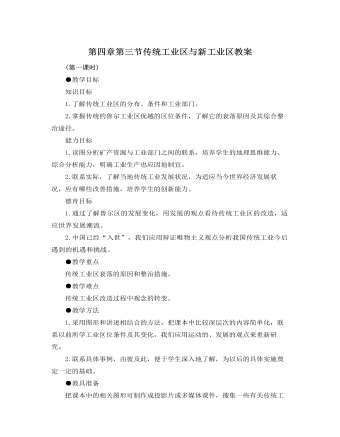
人教版新课标高中地理必修2第四章第三节传统工业区与新工业区教案
知识目标1.了解传统工业区的分布、条件和工业部门。2.掌握传统的鲁尔工业区优越的区位条件,了解它的衰落原因及其综合整治途径。能力目标1.读图分析矿产资源与工业部门之间的联系,培养学生的地理思维能力、综合分析能力,明确工业生产也应因地制宜。2.联系实际,了解当地传统工业发展状况,为适应当今世界经济发展状况,应有哪些改善措施,培养学生的创新能力。德育目标1.通过了解鲁尔区的发展变化,用发展的观点看待传统工业区的改造,适应世界发展潮流。2.中国已经“入世”,我们应用辩证唯物主义观点分析我国传统工业今后遇到的机遇和挑战。
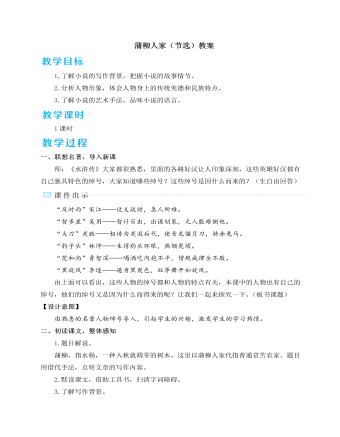
人教部编版语文九年级下册蒲柳人家(节选)教案
刘绍棠,中国当代著名乡土文学作家,1936年2月出生于河北通县(今北京通州区)大运河畔的儒林村,1949年开始发表作品,一生留下了500多万字的乡土文学作品,包括《地火》《京门脸子》等多部长篇小说,《蒲柳人家》《运河的桨声》等多部中篇小说,以及《青枝绿叶》《蛾眉》等多部短篇小说集。他的作品在国内多次获奖,在国际上亦有影响。刘绍棠的作品内容各不相同,但都艺术地再现了其家乡大运河畔不同历史时期的风土人情和社会风貌,描绘了充满诗情画意的乡风水色、世俗人情。20世纪80年代以来,刘绍棠不遗余力地倡导乡土文学,创作上坚持“中国气派,民族风格,地方特色,乡土题材”。文学评论家指出,他的作品格调清新淳朴,乡土色彩浓郁,形成了独具特色的大运河乡土文学风格。
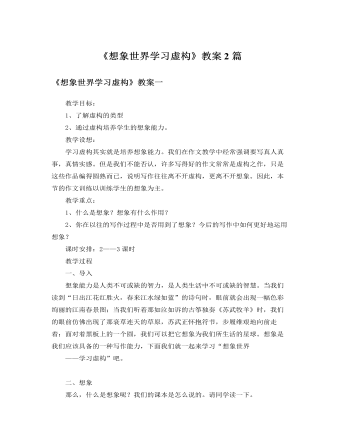
人教版高中语文必修2《想象世界学习虚构》教案2篇
虚构不等于说假话。它是一种源于生活,但高于生活的艺术真实。我们可以举个例子:我国公认的最权威最真实的史书是——《史记》,那么,大家认为《史记》里有没有虚构呢?有。必修一的《鸿门宴》里就有虚构。大家想:司马迁是哪个朝代的人?西汉汉武帝时。刘邦项羽是哪个朝代的?秦末时期。那司马迁不可能坐时光穿梭机到秦末去参加鸿门宴吧?既然他没不在场,那课文《鸿门宴》里人物的语言、动作、甚至是表情从何而来呢?对,是司马迁根据有限的史料加以补充,想象、虚构出来的。那么,同学们在写作文时,也可以不必拘泥于亲身经历的事情,毕竟生活是平淡的,毕竟大家的生活阅历也有限,有时候,我们发挥想象、虚构一个故事来反映生活的真实,也许更生动、也更典型。所以,近年来高考试卷中都提示考生:作文可以大胆想象,编写故事。按照编故事的方式不同,我们的虚构性作文又可以写哪些类型呢:小说,散文,童话,寓言,科幻,故事新编……
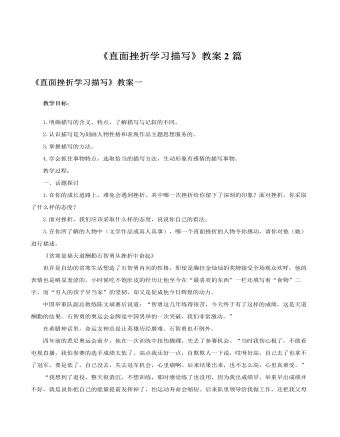
人教版高中语文必修2《直面挫折学习描写》教案2篇
《贫寒是福天道酬勤石智勇从挫折中奋起》也许是自幼的贫寒生活塑造了石智勇内向的性格,即使是胸挂金灿灿的奖牌接受全场观众欢呼,他的表情也是略显羞涩的。小时候吃不饱肚皮的经历让他至今在“最喜欢的东西”一栏还填写着“食物”二字,而“穷人的孩子早当家”的坚韧,却又是促成他今日辉煌的动力。中国举重队副总教练陈文斌赛后说道:“智勇这几年练得很苦,今天终于有了这样的成绩,这是天道酬勤的结果。石智勇的奥运会金牌是中国男举的一次突破,我们非常激动。”在希腊神话里,命运女神总是让英雄历经磨难。石智勇也不例外。四年前的悉尼奥运会前夕,他在一次训练中扭伤脚踝,失去了参赛机会。“当时我伤心极了,不敢看电视直播,我怕参赛的选手成绩太低了。高点我还好一点,自欺欺人一下说,哎呀好高,自己去了也拿不了冠军,要是低了,自己没去,失去冠军机会,心里痛啊。后来结果出来,也不怎么高,心里真难受。”
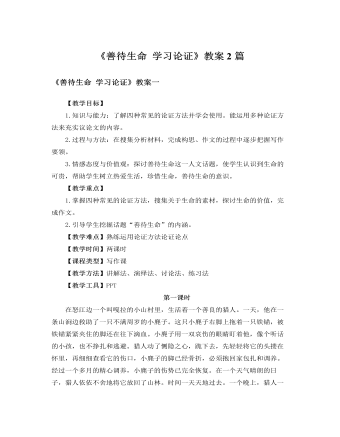
人教版高中语文必修3《善待生命 学习论证》教案2篇
论证方法之引证法如何用好引证法:1.所引用的名言警句等针对性要强。每句名言都产生于特定的背景,都应用于特定的交际目的,即使谈同一个问题,也有不少名言可供选取。2.要简洁,不宜过多。议论是在发表自己的见解而不是在介绍他人的见解。引用他人的话,目的是为了让读者更加信服自己的话。3.要注意直接引用和间接引用的区别。直接引用务求文字、甚至标点均准确无误;间接引用只须述其大意,但要注意人称的转换。论证方法之喻证法喻证法是用设喻来论证论点的方法。在议论文中,设喻可以使论点更易懂、更风趣、更容易获得读者的认同。喻证法能化抽象为具体、化艰深为浅显、化枯燥为生动。论证方法之喻证法如何用好喻证法:1.以小见大,就近取譬。要精选生活中细小的、人们熟悉的事物做为设喻的喻体。2.喻体不求形似,只求神似。做为喻证的喻体与做为比喻的喻体不同。比喻的喻体是为了强调特征,描绘事物,侧重形似,以形比形;而喻证的喻体是为了阐发观点,以正视听,力求神似,以义取形。
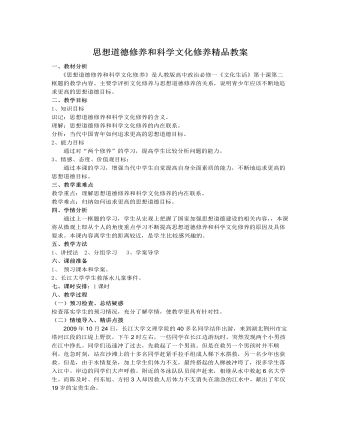
人教版高中政治必修3思想道德修养和科学文化修养精品教案
一、教材分析《思想道德修养和科学文化修 养》是人教版高中政治必修一《文化生活》第十课第二框题的教学内容。主要学评析文化修养与思想道德修养的关系,说明青少年应该不断地追求更高的思想道德目标。二、教学目标1、知识目标识记:思想道德修养和科学文化修养的含义。理解:思想道德修养和科学文化修养的内在联系。分析:当代中国青年如何追求更高的思想道德目标。2、能力目标通过对“两个修养”的学习,提高学生比较分析问题的能力。3、情感、态度、价值观目标:通过本课的学习,增强当代中学生自觉提高自身全面素质的能力,不断地追求更高的思想道德目标。三、教学重难点教学重点:理解思想道德修养和科学文化修养的内在联系。教学难点:归纳如何追求更高的思想道德目标。四、学情分析通过上一框题的学习,学生从宏观上把握了国家加强思想道德建设的相关内容,,本课将从微观上即从个人的角度重点学习不断提高思想道德修养和科学文化修养的原因及具体要求。本课内容离学生的距离较近,是学 生比较感兴趣的。
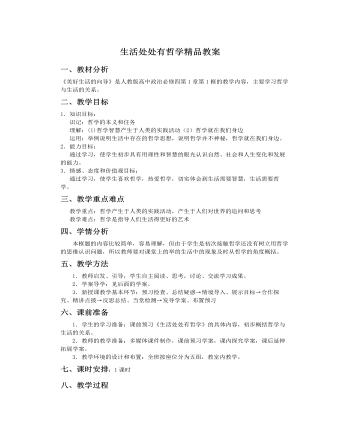
人教版高中政治必修4生活处处有哲学精品教案
(三)合作探究、精讲点拨。探究一:探究问题:如何看待排名一名高中生在谈到“排名的二重性”时说:“我们既不能盲目地张扬排名,也不能简单地否定排名。作为学生,如果用片面的观点对待排名,排在前面沾沾自喜、骄傲自满,排在后面灰心丧气、一蹶不振,就会停滞不前,甚至倒退;如果通过排名了解自己的学习实力以及同别人的差距,做到知彼知己,扬长避短,就会出现先进更先进、后进赶先进的生动局面。”问题:(1)在排名问题上,人们的看法往往各不相同,这是为什么?(2)为什么我们应看到排名的“二重性”?(3)联系生活中类似的事例,谈谈生活与哲学的关系。教师活动:指导学生阅读以上的材料,并思考所提问题。学生活动:阅读材料,分组讨论问题,发表自己的观点,分析材料中包含的哲学道理。教师点评:(1)在排名问题上,人们的看法不同,主要是因为人们的思维方法不同。

新人教版高中英语必修3Unit 1 Festivals and Celebrations-Reading and Thinking教学设计
The topic of this part is “Discover the reasons for festivals and celebrations.The Listening & Speaking & Talking part aims at talking about the experiences and feelings or emotions about the festivals and celebrations. This section aims at detecting the reason why the people celebrate the festivals, the time, the places, the types and the way of celebrations. It also explains why some traditions in the old celebrations are disappearing, like the firecrackers in the big cities and some new things are appearing like the prosperity of business or commerce. 1. Students can talk about what festivals they know and the reasons and the way of celebrating them.2. Students should learn the reading skills such as the headline and get the topic sentences, the structures of articles.3. Students can understand the past, the present situation of some festival around the world and why there are some changes about them. 4. Students can have the international awareness about the festivals.1. Students should learn the reading skills such as the headline and get the topic sentences, the structures of articles.2. Students can understand the past, the present situation of some festival around the world and why there are some changes about them.Step 1 Lead in---Small talkWhat festival do you like best ? Why ?I like the Spring Festivals because I can set off the fireworks, receive the lucky money and enjoy the Gala with my families.Step 2 Before reading---Pair workWhy do people celebrate different festivals ?The Spring Festivals is to celebrate the end of winter and the coming of spring and new life.The Mid-autumn Day is to celebrate the harvest and admire the moon.

新人教版高中英语必修3Unit 1 Festivals and Celebrations-Listening &Speaking&Talking教学设计
The theme of this section is “Talk about festival activities and festival experiences”.Festival and holiday is a relaxing and interesting topic for students. This part talks about the topic from the daily life of students’. In the part A ---Listening and Speaking, there are three conversations among different speakers from three countries(Japan, Rio and China), where the speakers are participating in or going to participate in the festivals and celebrations. So listening for the relationship among them is a fundamental task. Actually, with the globalization and more international communication, it is normal for Chinese or foreigners to witness different festivals and celebrations in or out of China. In the Conversation 1, a foreign reporter is interviewing a Japanese young girl who just had participated in the ceremony of the Coming-of-Age Day on the street and asking her feeling about the ceremony and the afterwards activities. Conversation 2, Chinese girl Li Mei is witnessing the Rio Carnival for the first time, and her friend Carla gives her some advice on the costumes which enables her to match with the carnival to have a good time. Conversation 3, a Chinese guide is showing a group of foreign visitors around the Lantern Festival and introducing the customs of the festival to them. The three conversations have a strong vitality and insert the festival and cultural elements from different countries. So perceiving the festivals and cultures from different countries is the second task. At the same time, the scripts also insert the targeted grammar --- v-ing as attributive and predicative, which students can perceive and experience in a real context and make a road for the further study. That is the third task. In the Part B--- Listening and Talking, the theme is “Talk about festival experience”, which is the common topic in our daily conversations. During the conversation, Song Lin, a Chinese student, asked Canadian friend Max about how to spend Christmas. In the conversation, Song Lin talked about experience and the feelings during the Chinese Spring Festival, during which there are not only some enjoyable things but some unpleasant things. After the listening, perhaps students find there are some similarities between Christmas and the Chinese Spring Festival as there are some differences in the origins and celebrations. For example, people always visit friends and relatives, decorate their houses, have a big dinner together, chat and give presents to each other.

新人教版高中英语必修3Unit 1 Festivals and Celebrations-Reading for writing教学设计二
Step 3 Analyzing article structureActivity 31. Teachers raise questions to guide students to analyze the chapter structure of this diary and think about how to describe the festival experience. (1)What should be included in the opening/body/closing paragraph(s)?(2)How did the writer arrange his/her ideas?(3)What kind of interesting details did the writer describe?(4)How did the writer describe his/her feelings/emotions during the event?2. Students read and compare the three sentence patterns in activity 2. Try to rewrite the first paragraph of the diary with these three sentence patterns. After that, students exchange corrections with their partners. Such as:●This was my first time spending three days experiencing the Naadam Festival in China’s Inner Mongolia Autonomous Region and it was an enjoyable and exciting experience. ●I'll never forget my experience at the Naadam Festival because it was my first time to watch the exciting Mongolian games of horse racing, wrestling, and archery so closely. ●I'll always remember my first experience at the Naadam Festival in China’s Inner Mongolia Autonomous Region because it was so amazing to spend three days witnessing a grand Mongolian ceremony. Step 4 Accumulation of statementsActivity 41. Ask the students to read the diary again. Look for sentences that express feelings and emotions, especially those with the -ing form and the past participle. Such as:● …horse racing, wrestling, and archery, which are all so exciting to watch. ● some amazing performances● I was surprised to see…● I was a little worried about. . . ● feeling really tiredOther emotional statements:●I absolutely enjoyed the archery, too, but the horse races were my favourite part. ●I'm finally back home now, feeling really tired, but celebrating Naadam with my friend was totally worth it. ●He invited me back for the winter to stay in a traditional Mongolian tent and cat hot pot. I can’t wait!2. In addition to the use of the -ing form and the past participle, the teacher should guide the students in the appreciation of these statements, ask them to memorize them, and encourage them to use them reasonably in writing practice.

新人教版高中英语必修3Unit 2 Morals and Virtues-Discovering Useful Structure教学设计
1. 表示时间。Hearing these stories, I’m skeptical about the place. = When I heard these stories. . . 2. 表示原因。Not knowing his address, I can’t send this book to him. = Because/Since/As I don’t know his address. . . 3. 表示结果。His father died, leaving him a lot of money. =. . . and left him a lot of money4. 表示条件。Going straight down the road, you will find the department store. = If you go straight down the road. . . 5. 表示让步。Being tired, they went on working. =Although they were tired. . . 6. 表示行为方式、伴随情况或补充说明。He lay on the grass, staring at the sky for a long time. =. . . and stared at the sky for a long time注意:非谓语动词作状语时, 如所提供的动词不能和句子中的主语保持一致, 动词-ing形式必须有自己的逻辑主语, 通常由名词或代词来担任, 这就是独立主格结构。The last bus having gone, we had to walk home. (having gone的逻辑主语是the last bus, 而不是we)Weather permitting, the football match will be played on Friday. (permitting的逻辑主语是time, 而不是the football match)Step 7 Practice1. ________(study) hard, you are sure to get first prize. 2. People use plastic in their daily life, _______(leave) large amounts of waste. 3. ________(work) hard at your lessons, you are to succeed. 4. The old man, ____________(work) abroad for twenty years, is on the way back to his motherland. 5. ______________(finish) his homework, he was playing on the playground. Answers: 1. Studying 2. leaving 3. Working 4.having worked 5. Having finishedStep 8 HomeworkFinish the homework on Page 22.

新人教版高中英语必修3Unit 2 Morals and Virtues-Listening &Speaking&Talking教学设计
Example:One day, a poor boy who was trying to pay his way through school by sending newspapers door to door found that he only had one dime(一角)left. He was so hungry that he decided to beg for a meal at the next house.However, he lost his nerve when a lovely young woman opened the door. Instead of a meal he asked for a drink of water. She thought he looked hungry so she brought him a large glass of milk. He drank it slowly, and then asked, “How much do I owe you?” “You don’t owe me anything,” she replied, “Mother has taught me never to accept pay for a kindness.” “Then I thank you from the bottom of my heart.” With these words, Howard Kelly left that house.Years later the woman became badly ill and was finally sent to the hospital in a big city. Dr. Howard Kelly, now famous, was called in. When he heard the name of the town she came from, a strange light filled his eyes. Dressed in his doctor’s clothes, Dr. Kelly went into her room and recognized her at once. From that day on, he gave special attention to her, and decided to do his best to save her life.At last the woman was saved. Dr. Kelly asked the business office to pass the final bill to him. He looked at it and then wrote something on the side. The bill was sent to the woman’s room. She was afraid to open it because she was sure that it would take the rest of her life to pay for it off. Finally she looked, and the note on the side of the bill caught her attention. She read these words: “Paid in full with a glass of milk, Dr. Howard Kelly.” Tear of joy flooded her eyes.

新人教版高中英语必修3Unit 2 Morals and Virtues-Reading for Writing教学设计
1. 这个寓言是一个关于一位国王古寓言。 The fable is an old fable about a king.2.作者用这个故事让读者对于社区的问题负有个人责任的必要印象深刻。The author used the story to impress upon readers with the need to take personal responsibility for problems in the community.3. 这个故事十分成功的实现了它的目的。The story was quite successful in achieving its purpose.Step 7 WritingPlease write a review of the story according the outline above.The fable is an old fable about a king who thought his people are lazy, so he put a large stone in the middle of the road and hides and waited to see if anyone will try to move it.The author used this story to impress upon readers with the need to take personal responsibility for problems in the community. The story was quite successful in achieving its purpose, and I liked it because it had a clear moral.However, while the moral of the story is clear, the actions of the king seemed pointless to me, because none of the characters in the story learnt anything. For this reason, I think there are better stories that can be used to impress upon people with the need for personal responsibility.Step 8 Pair workExchange drafts with a partner. Use this checklist to help your partner revise his/her draft.1. Does the writer give a short description of the story ?2. Does the description include the most important details of the story ?3. Does the writer give his or her opinion about the character or their actions ?4. Is the review well-organised ? 5. Does the writer use the -ing form as the adverbial correctly in the writing ?6. Are there any grammar, spelling, or punctuation errors ?Step 9 HomeworkPut up your revised draft in the classroom or read it to your class.

新人教版高中英语必修3Unit 3 Diverse Cultures-Discovering Useful Structure教学设计
Step 4 PracticeRead the conversation. Find out which words have been left out.Justin: Linlin, I’m going to Guizhou Province next month. I’m super excited! Any recommendations for places to visit?Linlin: Wow, cool! Guizhou is a province with a lot of cultural diversity. Places to visit...well, definitely the Huangguoshu Waterfall first.Justin: What’s special about the waterfall?Linlin: Well, have you ever heard of the Chinese novel Journey to the West ?Justin: Yes, I have. Why ?Linlin: In the back of the waterfall, you will find a cave, which is the home of the Monkey King.Justin: Really? Cool! I’ll definitely check it out.Linlin:And I strongly recommend the ethnic minority villages. You’ll find Chinese culture is much more diverse than you thought.Justin:Sounds great, thanks.Answers:Justin: Linlin, I’m going to Guizhou Province next month. I’m super excited! Do you have any recommendations for places to visit?Linlin: Wow, that’s cool! Guizhou is a province with a lot of cultural diversity. What are some places to visit in Guizhou ? Well, definitely the Huangguoshu Waterfall is the first place to visit in Guizhou Province.Justin: What’s special about the waterfall?Linlin: Well, have you ever heard of the Chinese novel Journey to the West ?Justin: Yes, I have heard of the Chinese novel Journey to the West . Why do you ask if I have heard of the Chinese novel Journey to the West?Linlin: In the back of the waterfall, you will find a cave, which is the home of the Monkey King from Journey to the West.Justin: That’s really true? It’s Cool! I’ll definitely check it out.Linlin:And I strongly recommend the ethnic minority villages on your trip to Guizhou Province. You’ll find Chinese culture is much more diverse than you thought it was.Justin:This all sounds great, thanks.

新人教版高中英语必修3Unit 3 Diverse Cultures-Reading for Writing教学设计
The topic of this part is “Describe a place with distinctive cultural identity”.This section focuses on Chinese culture by introducing Chinatown, whose purpose is to show the relationship between the Chinese culture and American culture. The Chinese culture in Chinatown is an important part of American culture. Chinatown is an important window of spreading Chinese culture and the spirit homeland of oversea Chinese, where foreigners can experience Chinese culture by themselves.Concretely, the title is “Welcome to Chinatown!”, from which we can know that the article aims at introducing Chinatown. The author used the “Introduction--Body Paragraph--Conclusion” to describe the people, language, architecture, business, famous food and drinks and people’s activities, which can be a centre for Chinese culture and shows its unique charm.1. Read quickly to get main idea; read carefully to get the detailed information.2. Learn the characteristics of writing and language.3. Learn to introduce your own town according to the text.4. Learn to correct others’ writing.1. Learn the characteristics of writing and language.2. Learn to introduce your own town according to the text.Step 1 Lead in ---Small talkIn the reading part, we mentioned the Chinatown of San Francisco. How much do you know about Chinatown of San Francisco ?Chinatown is a main living place for Chinese immigrants, where you can see many Chinese-style buildings, costumes, operas, restaurants, music and even hear Chinese.Step 2 Before reading ---Predict the contentWhat is the writer’s purpose of writing this text ? How do you know ?From the title(Welcome to Chinatown) and some key words from the text(tourist, visit, visitors, experience), we can know the purpose of the text is to introduce Chinatown and show the relationship between Chinese culture and American culture.


